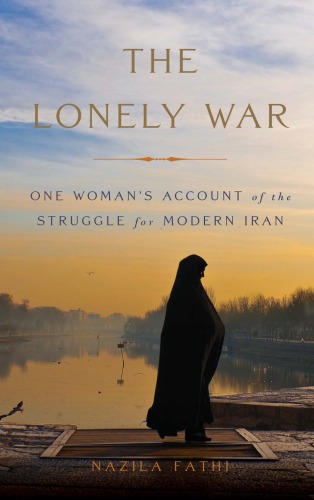
The Lonely War
One Woman's Account of the Struggle for Modern Iran
کتاب های مرتبط
- اطلاعات
- نقد و بررسی
- دیدگاه کاربران
نقد و بررسی

October 15, 2014
Cautious but subtly optimistic account of Iran's unfinished revolution by New York Times correspondent Fathi.The author was still a child when, in 1979, an insurrection led by an uneasy alliance of leftists and Muslim fundamentalists forced the shah of Iran from his throne. As she notes, more than two-thirds of her compatriots were not even born when these transformative events occurred, and though the ayatollahs imposed an austere rule over the country, Iran's young men and women have been "exposed to new ideas and opinions through technologies such as satellite television and the Internet." In other words, Iran is not monolithic in its religious conservatism, nor in any other way; neither is it backward, though the suspicion that it is haunts Iranians: Backwardness, writes the author, "had embarrassing connotations of ignorance, poverty, and underdevelopment." Crunching the numbers, it wouldn't seem that the Iranians have much to worry about, for Fathi reckons that two-thirds of the country is also solidly middle-class, which would rival the statistics for the United States. The concept of backwardness, though, is a strong one, dating back many generations, and it has explanatory power for why Iran should so often make the news trying to assert itself in regional and even world events. Fathi's combination of reportage and memoir is often effective, as when she writes of religion through the lens of an experience with a teacher who assured her that her prayers were "nullified" because her hood wasn't arranged just so: "Her Islam was more about outward signs...to a point that was annoying." Though, as the author notes, Iran has more than its share of dour by-the-book religionists, it is also refreshingly diverse and heterodox-if also in need of much change. Readers keeping an eye on the contemporary Middle East will learn much from Fathi's travels and observations.
COPYRIGHT(2014) Kirkus Reviews, ALL RIGHTS RESERVED.

Starred review from December 1, 2014
With dazzling frankness and authenticity, New York Times political correspondent Fathi shows the reality faced by Iranian citizens throughout the last 30 years of political upheaval in the country. Fathi eschews sanitized, dissociated facts typical of the American news cycle and instead invites the reader into an intimate space: the home where she grew up and the small apartment she shared with her own children. Her recounting of the fluctuations in Iranian politics, from the removal of the shah in 1979 to the riots after Mahmoud Ahmadinejad's corrupt reelection in 2009, is personal, like a person talking about a loved one's addiction. It is clear that we are hearing the story of a woman and a country she loves and believes in, and whose faults she is willing to face without blinders. With beautiful descriptions of the places and people of Iran alongside bald reports of the brutality of the conflicts between citizens and government, Fathi's book is multifaceted and incredibly informative. Readers of history and politics will revel in the accurate reporting of a veteran journalist and lovers of human interest stories will feel gratified to know Fathi so personally. VERDICT This educational, emotionally enthralling read about a country many Americans know only a little about is a must-read.--Kathleen Dupre, Edmond, OK
Copyright 2014 Library Journal, LLC Used with permission.

November 1, 2014
New York Times correspondent Fathi was being watched. The Iranian agents had her apartment under surveillance and tailed her when she went out. The intimidation and fear were too much for her, and she and her family escaped to a life of exile from her homeland. Now the journalist retells both her own story and that of Iran in this gripping account of the three decades following the revolution that brought Ayatollah Khomeini to power and created the Islamic Republic. Ever the professional, Fathi maintains a reasonable and precise tone, even when recounting violent protests and personal discrimination. She distills complex events at the national level down to their impact on individuals, such as the video-man peddling bootleg copies of foreign movies and TV shows, and the girls sitting by the pool, wondering when they will be allowed to swim again. The regime as observed by Fathi is oppressive and yet full of surprising contradictions, while the people remain undaunted despite the odds. This is essential reading for anyone interested in the evolution of modern Iran.(Reprinted with permission of Booklist, copyright 2014, American Library Association.)

























دیدگاه کاربران